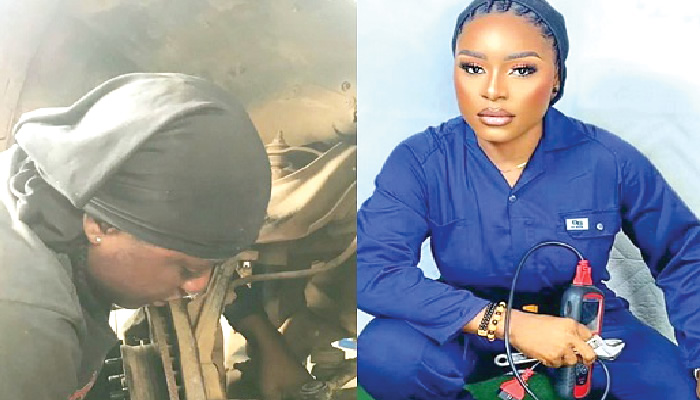
A 25-year-old female mechanical engineer from Ibadan, Adijat Ganiyu, tells TEMITOPE ADETUNJI why she embraced a vocation dominated by men, among other related issues
What informed your decision to become a female mechanic?
Actually, being a mechanic wasn’t my plan. I wanted to study Science and Laboratory Technology; I was given a full-time admission at The Polytechnic Ibadan but because I got the opportunity to work, I switched from full-time to part-time and that was when I was offered Mechanical Engineering. I couldn’t reject the course because I was desperate to go to school; I was ready to take any course because I wanted to go to school. I didn’t want to do something different from what I studied in school so that my certificate would not be a waste.
What year did you gain admission?
I gained admission into The Polytechnic Ibadan in 2014.
What is it like to be a woman in a male-dominated vocation?
I feel it is something that makes a woman to feel special and unique. When you are doing things outside the box, you will be respected, though there will always be discrimination.
What kind of discrimination did you face?
I faced discrimination in the sense that when I wanted to learn professionally, I learnt for five years, and I have my certificate. After ending my OND programme at The Polytechnic Ibadan, I spent three years in school as a part-time student, I finished in 2017. So, I attached myself to a mechanic workshop where I learnt from the owner. He taught me all the necessary things I needed to know. When people bring their cars to our workshop, they always ask me if I can fix their cars. Occasionally, people doubt your capability. Some will say, ‘Is she going to be the one to fix my tyres? Can she really do this?’
What was your parent’s reaction when you made the decision of becoming a mechanic?
Mechanical engineering was a course given to me with faith; I used to help my mum in hawking oranges, garden eggs, and groundnut. Going to school was a decision I made after my secondary school. I don’t want to hawk anymore. So, when I started the mechanic vocation, my parents were not aware because I felt I might be discouraged, and I wouldn’t want to disobey them. I respect them so much. I am the second child out of three children, and I am the only female child. They (parents) became aware after two years of learning the vocation and they had no choice but to accept my decision.
How long have you been in this career line?
It’s been seven years now. Presently, I work as a mechanic, even though I don’t have my own workshop. I currently work with a company; I do personal jobs and also take contracts.
What has been your general experience as a female mechanic?
This line of career has given me exposure in terms of meeting people; I have been an inspiration to other ladies too. I am an advocate for gender equality; I want women to always think outside of the box. I have made little connections with people based on this career.
What are your regrets?
No regrets about my choice of career so far.
Who are your role models?
Claudia Grace Joyce is a BMW mechanic in New York. She is an actress and a boxer, a model and a mechanic, and she is an inspiration to me. Another person is Sandra Aguebor, I think she is the first female mechanic in Nigeria, hoping to meet her one day because she is an inspiration; I have read a lot about her.
What are your biggest dreams?
I want to have a car girl garage where I will be able to train girls in this automotive industry for free. I want to have a platform where I will be able to encourage girls to do things outside the box. I believe these dreams are achievable. I am still working towards them, and I pray God will grant my efforts.
What are your achievements so far?
Well, I am currently running my HND programme at The Polytechnic Ibadan and this career line has helped me to be able to sponsor my academics with the money I get from the mechanical service I render to people.
Do you think people prefer to patronise women that are into male-dominated vocations more than men?
Well, I think people love to patronise women because they want to see what we can do.
What are your challenges?
The only challenge I have is that I don’t have my own workshop; I just go out to render my service. If I have a place where people can come and see what I do, I will have more customers. That is why I want to work with some other ladies so that we can have a garage where every section would be operated by ladies. Sections like a car wash, mechanical workshop, panel beating, and others will be operated by ladies.
What advice do you have for women looking to embrace a male-dominated profession/vocation?
Good things don’t come easily; they should stand their ground and keep doing what they love. There are times, you may feel discouraged, but don’t stop. I hope Nigeria will have a working government one day. The government should encourage us; I know some of my mates that are ticket collectors and okada riders just because they need to fend for themselves. The government needs to do better, and this will reduce the rate of crime among the youth.
Where do you see yourself 10 years from now?
I see myself having a big workshop of my own, training females, and making use of technology in my line of vocation.














